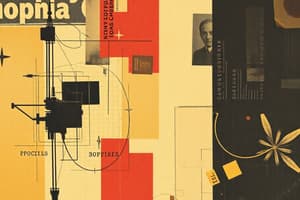Podcast
Questions and Answers
What is a probability experiment?
What is a probability experiment?
- A method to calculate probability
- A process that produces outcomes (correct)
- A theoretical model
- An experiment with a definite result
What is an outcome in probability?
What is an outcome in probability?
An individual result that is possible from an experiment.
What is the set of all possible outcomes for a given probability experiment called?
What is the set of all possible outcomes for a given probability experiment called?
Sample space.
What is an event in probability?
What is an event in probability?
A thought experiment requires actual trials.
A thought experiment requires actual trials.
How is the probability of an event calculated?
How is the probability of an event calculated?
What is the sample space of flipping a fair coin 3 times?
What is the sample space of flipping a fair coin 3 times?
What is the outcome of flipping a fair coin once?
What is the outcome of flipping a fair coin once?
What is a tree diagram used for?
What is a tree diagram used for?
What is subjective probability?
What is subjective probability?
What is empirical probability?
What is empirical probability?
What does the Rounding Rule state in probability?
What does the Rounding Rule state in probability?
What does the Law of Large Numbers state?
What does the Law of Large Numbers state?
What is classical probability?
What is classical probability?
How many outcomes are in the sample space when tossing a coin?
How many outcomes are in the sample space when tossing a coin?
What is the probability of rolling a 6-sided die and obtaining an even number?
What is the probability of rolling a 6-sided die and obtaining an even number?
How would you determine the probability of flipping at least 2 heads in 3 flips of a fair coin?
How would you determine the probability of flipping at least 2 heads in 3 flips of a fair coin?
How is the probability of drawing a spade calculated?
How is the probability of drawing a spade calculated?
What is the probability of drawing a two or a Queen from a deck of cards?
What is the probability of drawing a two or a Queen from a deck of cards?
Flashcards are hidden until you start studying
Study Notes
Probability Experiment
- A process that produces random outcomes; examples include flipping a coin, tossing dice, or drawing a raffle ticket.
Outcome
- The individual result possible from a probability experiment.
Sample Space
- All mutually exclusive outcomes of an experiment; also referred to as the probability space.
Event
- A subset of outcomes from the sample space, consisting of one or more possible results.
Thought Experiment
- An abstract scenario that does not require an actual experiment to analyze outcomes.
Probability of an Event
- Calculated as the number of favorable outcomes divided by the total number of outcomes in the sample space.
Sample Space of Flipping a Coin 3 Times
- There are 8 possible combinations of outcomes when a fair coin is flipped three times.
Outcome of Flipping a Coin Once
- The result can be either heads or tails.
Example of a Probability Experiment
- Drawing a number from a hat containing 1 to 10 has ten possible outcomes, with specific events like drawing an even number (2, 4, 6, 8, or 10).
Tree Diagram
- A systematic way to organize outcomes in experiments with several stages for clarity in representation.
Subjective Probability
- An educated guess about the likelihood of an event occurring, influenced by the estimator’s expertise.
Empirical Probability
- Derived from observed data, calculated as the number of times an event occurs divided by the total number of trials.
Rounding Rule
- Present probabilities as exact fractions or decimals rounded to three digits; small probabilities may be rounded to the first nonzero digit.
Law of Large Numbers
- Suggests that as the number of trials increases, the empirical probability will approach the true probability.
Classical Probability
- The most precise type of probability calculated by considering all possible outcomes, defined by n(E) over n(S).
Probability Classifications
- Subjective: Based on educated guess (e.g., teacher predicting class grades).
- Empirical: Based on statistics from observed data (e.g., optometrist's estimate from local school data).
- Classical: Relies on known outcomes (e.g., probability of winning in bingo).
Outcomes When Tossing a Coin
- There are two outcomes: heads and tails.
Outcomes When Rolling a Die
- For rolling an even number with a 6-sided die, three favorable outcomes exist: rolling a 2, 4, or 6.
Probability of Flipping Two Heads in 3 Coin Flips
- There are three favorable outcomes (HHT, HTH, THH) and a total of eight outcomes; probability is calculated as 3/8 or 0.375.
Probability of Flipping at Least Two Heads in 3 Flips
- There are four favorable outcomes (HHT, HTH, THH, HHH) resulting in a probability of 4/8 or 50%.
Drawing a Spade from a Deck
- There are 13 spades in a deck of 52 total cards, yielding a probability of 13/52 or 0.25.
Drawing a Two or a Queen from a Deck
- Eight possible outcomes exist (4 twos and 4 queens) out of 52 cards, leading to a probability of 8/52 or approximately 0.1539.
Studying That Suits You
Use AI to generate personalized quizzes and flashcards to suit your learning preferences.




